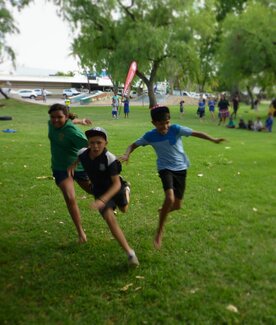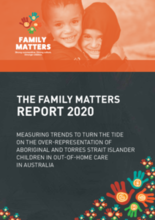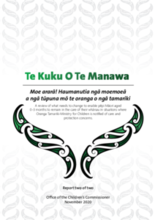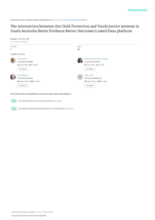

Displaying 141 - 150 of 677
In this study, data derived from 17 qualitative face-to-face interviews are used to explore the lived experiences of Indigenous mothers affected by domestic and family violence (DFV) in Australia.
Family Matters reports focus on what governments are doing to turn the tide on over-representation of Aboriginal and Torres Strait Islander children in out-of-home care and the outcomes for children. They also highlight Aboriginal and Torres Strait Islander-led solutions and call on governments to support and invest in the strengths of Aboriginal and Torres Strait Islander peoples to lead on child wellbeing, development and safety responses for our children.
"Amid a two-year scuffle to reform Australia’s family law system, which is buckling under so much work that some judges are dealing with more than 600 cases, the parade of desperate and troubled people through its courts crawls on," says this article from the Guardian.
The purpose of this study is to test the validity of the Assessment Checklist measures in assessing complex mental health and behavioural difficulties of children and young people in care attending a specialist mental health service in Queensland, Australia.
This article presents a brief scoping review of the literature on the educational outcomes of care experienced children and young people in Australia published since 2010.
For this study, a qualitative case file review was carried out to examine the nature of violence recorded in the narratives of 91 prenatal child protection reports from a single Australian jurisdiction in 2014.
In this episode of Nightlife, the hosts talk to three young people who spent their founding years in foster care. The young people discuss the challenges they faced and how the system can be improved.
The Children’s Commissioner of New Zealand undertook a thematic review of the policies, processes and practices of Oranga Tamariki Ministry for Children relating to care and protection issues for pēpi Māori (Māori infants) aged 0-3 months. This second report comes to the clear conclusion that to keep pēpi in the care of their whānau, Māori must be recognised as best placed to care for their own.
The purpose of this research was to examine the overlap between the Youth Justice (YJ) and the Child Protection (CP) systems in Australia, and profile selected characteristics of children and young people who have YJ and CP system involvement.
This article from the Sydney Morning Herald highlights a new position that has been created - NSW deputy guardian for Aboriginal children and young people - as part of government reforms to reduce the stark over-representation of Indigenous children in state care, and the head of the national peak body for First Nations children, Richard Weston, who will fill that role.



